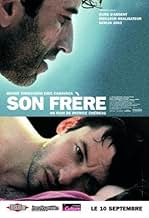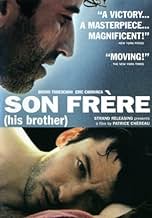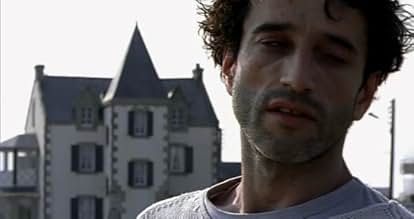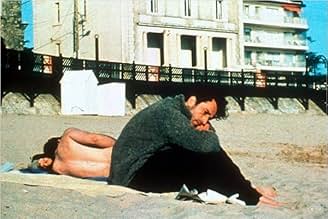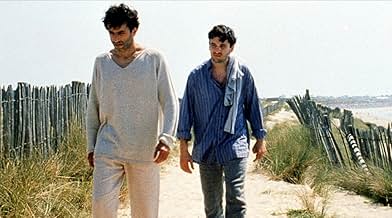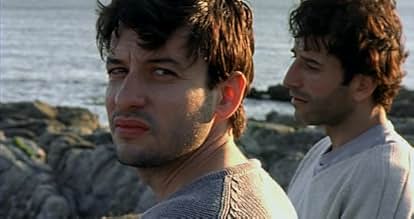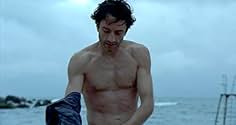Ajouter une intrigue dans votre langueTwo brothers with a problematic relationship in the past, find together again when the elder one gets a dangerous disease and asks his brother to accompany him to several doctors.Two brothers with a problematic relationship in the past, find together again when the elder one gets a dangerous disease and asks his brother to accompany him to several doctors.Two brothers with a problematic relationship in the past, find together again when the elder one gets a dangerous disease and asks his brother to accompany him to several doctors.
- Récompenses
- 2 victoires et 4 nominations au total
Histoire
Le saviez-vous
- Bandes originalesSleep
Performed by Marianne Faithfull
Written by Marianne Faithfull, Frank McGuinness (as Frank McGuiness), Angelo Badalamenti
© ANLON MUSIC Co. (P) 1995 ISLAND RECORDS INC.
Avec l'aimable autorisation de Universal Music Projets Spéciaux
Commentaire à la une
French director Patrice Chereau's Son Frére is an almost unbearably intimate story about the disconnect between two brothers that, like The Death of Mr. Lazarescu, provides a clinical dissection of the sterility of hospitals and their failure to confront the human dimension of illness. Based on the Philippe Besson novel, "Son Frére," the film centers on the relationship between two brothers, one gay, the other straight. Luc (Eric Caravaca) is a gay man who has been estranged from his older brother Thomas (Bruno Todeschini), a graphic artist, though they live close to each other in Paris. Though there is little back story, the suggestion is that their relationship was sabotaged by homophobia.
When Thomas calls Luc on his cell phone to tell him that he is suffering from a potentially fatal blood disorder, Luc goes to the hospital to be with him, cutting off his relationship with his lover Vincent (Sylvain Jacques). Luc, at first resentful, tells his brother that the only reason he is there is because he was asked and his feelings of betrayal are evident. Neither their father (Fred Ulysse) nor their mother (Antoinette Moya) offer any comfort, only exacerbating the situation by telling Luc that they wish it would have been him instead of Thomas. Thomas' girlfriend Claire (Nathalie Boutefeu) is also of little help, feeling powerless to offer Thomas much assistance.
Thomas' platelet count continues to drop and, as the possibility of a fatal hemorrhage increases, the doctors decide to remove his spleen but it does not produce the desired result. The film shifts between scenes at the hospital and ones at Luc's house near the seaside, cutting backwards and forwards in time. Despite inter-titles that identify the month in which the sequence is taking place, however, the chronology is confusing. As the illness progresses and the toll of hospital corridors, waiting rooms, and invasive procedures multiply, fatigue and inevitability sets in as the brothers struggle to reawaken some of their previous intimacy.
Luc shares a touching anecdote from their childhood about how Thomas saved him from school bullies and when his brother seems ready to give up, Luc rubs his back searching for some meaningful way of connecting. When they finally proclaim their love for one another, however, the cycle of resignation and despair has already gone too far to be reversed and Luc seems to passively accept its inevitability. In one of the film's most affecting scenes, we watch the excruciatingly slow and painstaking removal of all Thomas' body hair with an electric shaver in preparation for his operation by cheery, smiling technicians.
Another moving scene, perhaps the most emotional in the entire film, is the casual meeting between Luc and a 19-year old patient (Robinson Stevenin) in the hospital hallway. The patient is distraught about the possibility of another major surgery and Luc instinctively reaches out to embrace him. On the whole, however Son Frére is not an overtly emotional experience. To its credit, it studiously avoids displays of sentiment or peak dramatic moments but its affect can be flat and distancing. We long for a breakthrough or some catharsis that will bring release from all the bleakness, but Chereau does not offer any and Son Frére leaves us only with a feeling of sadness and a sober reflection on any damaged relationships of our own.
When Thomas calls Luc on his cell phone to tell him that he is suffering from a potentially fatal blood disorder, Luc goes to the hospital to be with him, cutting off his relationship with his lover Vincent (Sylvain Jacques). Luc, at first resentful, tells his brother that the only reason he is there is because he was asked and his feelings of betrayal are evident. Neither their father (Fred Ulysse) nor their mother (Antoinette Moya) offer any comfort, only exacerbating the situation by telling Luc that they wish it would have been him instead of Thomas. Thomas' girlfriend Claire (Nathalie Boutefeu) is also of little help, feeling powerless to offer Thomas much assistance.
Thomas' platelet count continues to drop and, as the possibility of a fatal hemorrhage increases, the doctors decide to remove his spleen but it does not produce the desired result. The film shifts between scenes at the hospital and ones at Luc's house near the seaside, cutting backwards and forwards in time. Despite inter-titles that identify the month in which the sequence is taking place, however, the chronology is confusing. As the illness progresses and the toll of hospital corridors, waiting rooms, and invasive procedures multiply, fatigue and inevitability sets in as the brothers struggle to reawaken some of their previous intimacy.
Luc shares a touching anecdote from their childhood about how Thomas saved him from school bullies and when his brother seems ready to give up, Luc rubs his back searching for some meaningful way of connecting. When they finally proclaim their love for one another, however, the cycle of resignation and despair has already gone too far to be reversed and Luc seems to passively accept its inevitability. In one of the film's most affecting scenes, we watch the excruciatingly slow and painstaking removal of all Thomas' body hair with an electric shaver in preparation for his operation by cheery, smiling technicians.
Another moving scene, perhaps the most emotional in the entire film, is the casual meeting between Luc and a 19-year old patient (Robinson Stevenin) in the hospital hallway. The patient is distraught about the possibility of another major surgery and Luc instinctively reaches out to embrace him. On the whole, however Son Frére is not an overtly emotional experience. To its credit, it studiously avoids displays of sentiment or peak dramatic moments but its affect can be flat and distancing. We long for a breakthrough or some catharsis that will bring release from all the bleakness, but Chereau does not offer any and Son Frére leaves us only with a feeling of sadness and a sober reflection on any damaged relationships of our own.
- howard.schumann
- 4 févr. 2007
- Permalien
Meilleurs choix
Connectez-vous pour évaluer et suivre la liste de favoris afin de recevoir des recommandations personnalisées
- How long is His Brother?Alimenté par Alexa
Détails
Box-office
- Montant brut aux États-Unis et au Canada
- 22 834 $US
- Week-end de sortie aux États-Unis et au Canada
- 6 802 $US
- 4 avr. 2004
- Montant brut mondial
- 131 195 $US
- Durée1 heure 32 minutes
- Couleur
- Mixage
- Rapport de forme
- 1.85 : 1
Contribuer à cette page
Suggérer une modification ou ajouter du contenu manquant

Lacune principale
By what name was Son frère (2003) officially released in Canada in English?
Répondre

